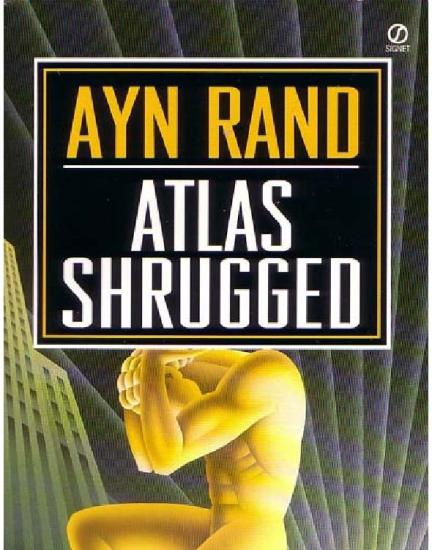
Summary:
Atlas Shrugged is a novel by Ayn Rand, first published in
1957 in the United States. It was Rand's fourth, longest and
last novel, and she considered it her magnum opus in the realm
of fiction writing.[1] As indicated by its working title The
Strike, the book explores a dystopian United States where
leading innovators, ranging from industrialists to artists,
refuse to be exploited by society. The protagonist, Dagny
Taggart, sees society collapse around her as the government
increasingly asserts control over all industry, while society's
most productive citizens, led by the mysterious John Galt,
progressively disappear. Galt describes the strike as "stopping
the motor of the world" by withdrawing the "minds" that drive
society's growth and productivity; with their strike these
creative minds hope to demonstrate that the economy and society
would collapse without the profit motive and the efforts of the
rational and productive. The novel's title is a reference to the mythical Titan,
Atlas, who in the novel is said to hold the weight of the
heavens on his shoulders.[2] The character of Francisco
d'Anconia at one point asks what sort of advice someone would
give to Atlas, and Francisco says he'd tell Atlas "to shrug"
(with Atlas being a metaphor for the champions of industry who
keep the world in place). The novel includes elements of
mystery and science fiction,[3] and it contains Rand's most
extensive statement of Objectivism in any of her works of
fiction, a lengthy monologue delivered by the strike's leader,
John Galt.[4] The theme of Atlas Shrugged is the morality of rational
self-interest and portrayal of self-loathing of monetary values
within a once thriving "New America". It advocates the core
tenets of Rand's philosophy of Objectivism and expresses her
concept of human achievement. The book explores a number of
philosophical themes that Rand would subsequently develop into
the philosophy of Objectivism.[5][6] It centers on the decline
of Western civilization, and Rand described it as demonstrating
the theme of "the role of man's mind in existence." In doing so
it expresses many facets of Rand's philosophy, such as the
advocacy of reason, individualism, the market economy and the
failure of government coercion. Atlas Shrugged received largely negative reviews after its
1957 publication,[7] but achieved enduring popularity and
consistent sales in the following decades. In the wake of the
late 2000s recession sales of Atlas Shrugged have sharply
increased, according to The Economist magazine and The New York
Times. The Economist reported that the fifty-two-year-old novel
ranked #33 among Amazon.com's top-selling books on 13 January,
2009.
Tags: [ZDC:WGWX, ZDC:YWSJ, CNTY:USA]